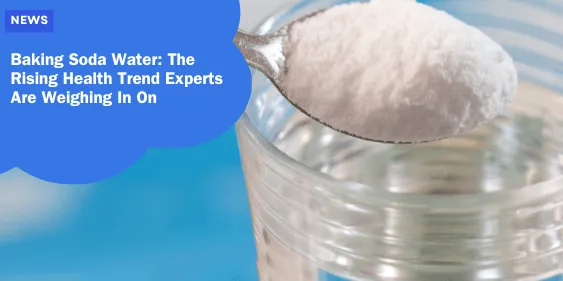Baking Soda Water: The Rising Health Trend Experts Are Weighing In On

The rise of baking soda water as a health trend has taken social media by storm.
People are adding this pantry staple to their water and claiming it offers a range of benefits, from alleviating acid reflux to boosting energy levels.
Given its composition—sodium bicarbonate, an alkaline substance—baking soda is thought to neutralize stomach acids and perhaps even provide relief for digestive issues.
However, the same chemical properties that make baking soda useful in the kitchen and for cleaning also necessitate caution when ingesting it.
Health Claims and Popularity
The claims about baking soda water are a mixed bag. Proponents argue that it offers relief from acid reflux, aids in digestion, and boosts energy levels.
Some even go as far as to say it can enhance athletic performance and help slow the progression of chronic kidney disease.
These assertions have certainly contributed to its growing popularity, with many turning to baking soda water as a quick and easy home remedy.
The Need for Expert Opinion
However, experts like Frances Largeman-Roth, a registered dietitian, stress the importance of caution.
Just because baking soda is natural doesn’t mean it’s automatically safe to consume in large amounts or over long periods.
Overconsumption can lead to significant health problems, such as metabolic alkalosis, which can disturb the body’s pH balance and cause severe complications.
Transitioning to Detailed Analysis
Examining the chemistry and science behind baking soda, its potential health benefits, and the research supporting or refuting these claims will give a more nuanced understanding of its role in health.
We’ll also explore the risks associated with its consumption, the necessary precautions, and expert recommendations to ensure safe use.
This comprehensive approach will help you make an informed decision on whether baking soda water is a trend worth following.
The Science Behind Baking Soda
Composition and Alkaline Nature of Sodium Bicarbonate
Baking soda, scientifically known as sodium bicarbonate, is a natural compound made up of sodium, hydrogen, carbon, and oxygen elements.
Its chemical formula, NaHCO₃, reveals its composition. What makes baking soda particularly interesting is its alkaline nature.
On the pH scale, which ranges from 0 to 14, baking soda lands on the higher end, around 8.3, identifying it as a basic or alkaline substance.
This property is crucial in understanding how it interacts within our body.
How Baking Soda Interacts with Body Chemistry
When consumed, baking soda can affect our body’s internal pH.
The human body tightly regulates its pH levels, with the blood pH typically between 7.35 and 7.45.
Sodium bicarbonate, being alkaline, can neutralize acids.
For example, baking soda water can mitigate acid reflux by neutralizing stomach acid, which has a much lower pH, around 1-2.
This neutralization process can provide temporary relief from the burning sensation caused by acid indigestion.
However, integrating an alkaline substance like baking soda isn’t without risks.
Overconsumption can lead to imbalances, causing the body’s natural pH regulation to go awry.
This imbalance can manifest as conditions such as metabolic alkalosis, where the body’s pH becomes too high, leading to harmful effects like mental confusion, muscle twitching, and decreased blood flow to the brain.
The Importance of pH Balance in the Human Body
pH balance is critical for the optimal functioning of various physiological processes.
Different body parts maintain distinct pH levels to function correctly. For example:
- The stomach maintains a highly acidic environment (pH around 1) for digestion and pathogen defense.
- The skin has a slightly acidic pH of about 5.5, which protects against bacteria and environmental harm.
- Blood must stay within a narrow pH range of 7.35-7.45 to support vital metabolic processes.
Balancing pH is crucial because even minor deviations can disrupt enzyme activity, oxygen transport, and cellular health.
Thus, while baking soda can temporarily alter pH levels to provide relief from symptoms like acid reflux or to aid high-intensity exercise performance, maintaining a proper balance is essential for long-term health.
Understanding these scientific principles sets the stage for evaluating baking soda’s potential health benefits and risks—an aspect we’ll delve into next.
Potential Health Benefits
Improved Exercise Performance
One of the most compelling benefits of baking soda water is its potential to improve exercise performance, especially in high-intensity activities.
Research shows that baking soda, or sodium bicarbonate, can reduce muscle acidity during anaerobic exercises like sprinting and jumping rope.
This reduction in acidity helps to delay muscle fatigue and enhance performance.
According to Dr. Tamara Hew-Butler, an exercise physiologist, ingesting baking soda before exercise can increase performance during short, high-intensity activities by reducing the “burn” associated with muscle acidity.
Relief for Acid Reflux and Indigestion
Another frequently mentioned benefit is relief from acid reflux and indigestion.
Baking soda is a common ingredient in many antacids because of its ability to neutralize stomach acid.
This neutralizing effect can provide temporary relief for those suffering from acid-related digestive issues.
According to dietitian Grace Derocha, mixing a small amount of baking soda in water can help manage symptoms of acid reflux, although it’s best consumed after eating when stomach acid is not required for food digestion.
Potential to Slow Chronic Kidney Disease Progression
There’s also promising, albeit mixed, evidence that baking soda may help slow the progression of chronic kidney disease.
In people with this condition, the kidneys don’t function well enough to remove sufficient acid from the body, leading to more acidic blood.
Some studies suggest that bicarbonate supplementation can help offset this acid load, giving the kidneys less acid to deal with.
For example, a study in “The American Journal of Medicine” found that consuming daily doses of baking soda tablets was associated with slower kidney disease progression over five years.
However, these findings are mixed, as some other studies did not find the same benefits.
Ultimately, while baking soda water can offer multiple health benefits, it is essential to proceed with caution and consult with healthcare professionals.
Research Findings and Limitations
Mixed Results on Kidney Disease and Hypertension
Recent studies have attempted to uncover the efficacy of baking soda water in slowing the progression of chronic kidney disease.
One study followed 153 individuals with hypertension and high risk of worsening kidney disease.
Participants who consumed baking soda supplements showed slower kidney disease progression over five years compared to those receiving standard care.
However, this supplementation did not lead to noticeable improvements in blood pressure or cardiovascular disease risk, which mirrors mixed findings from about 15 other studies.
Limited Research on Long-Term Effects
Some preliminary short-term studies suggest potential benefits like reduced inflammation, which could theoretically help alleviate conditions such as rheumatoid arthritis.
However, these studies had limitations, such as short duration—one study lasted only two weeks—which prevents conclusions about long-term safety and efficacy.
Inconclusive Results on Inflammation Reduction
Inflammation is a critical factor in numerous health issues, ranging from heart disease to Alzheimer’s.
Some evidence points to baking soda’s potential to lower inflammation, yet the overall body of research remains inconclusive.
Discrepancies in study duration, sample sizes, and methodologies contribute to these uncertainties, highlighting the need for more comprehensive, long-term studies to validate these early findings.
Experts emphasize the importance of individualized medical advice and further research to better understand the nuanced impacts of baking soda on our health.
Risks and Precautions
Potential Interference with Medication Efficacy
Before adding baking soda water to your routine, it’s crucial to understand how it can interfere with medications.
Lower stomach acid from consuming baking soda may delay or alter the effects of certain drugs.
This includes medications that rely on stomach acidity for proper absorption, such as antifungal drugs and aspirin.
If you are on any prescribed medications, particularly those that are sensitive to pH changes, consult your healthcare provider before incorporating baking soda water into your regimen.
Risks for Certain Groups
Baking soda water poses specific risks for particular segments of the population:
- Children and Pregnant Women: The high sodium content in baking soda can be harmful to children and pregnant women. Pregnant women are particularly at risk as high sodium intake can exacerbate hypertension, which is dangerous during pregnancy.
- Cardiovascular Issues: Individuals with cardiovascular problems should also exercise caution. High sodium levels can worsen conditions like high blood pressure and congestive heart failure.
- Elderly and Individuals with Chronic Illnesses: Due to compromised kidney function, the elderly and those with chronic illnesses should avoid baking soda water unless advised otherwise by a healthcare professional.
Dangers of Overconsumption and Long-term Use
While the short-term use of baking soda water may provide relief for some conditions, long-term use or overconsumption can lead to serious health issues:
- Metabolic Alkalosis: This condition occurs when the body’s pH becomes overly alkaline, leading to symptoms such as confusion, tremors, and muscle twitching. Severe cases can result in a decrease in oxygen flow to tissues and organs.
- High Sodium Levels: Just a teaspoon of baking soda contains a significant amount of sodium, edging closer to or surpassing the daily recommended intake. Chronic high sodium intake can result in elevated blood pressure and increase the risk of heart disease.
- Rebound Hyperacidity: Overuse of baking soda to reduce stomach acid might prompt the stomach to produce even more acid, exacerbating issues like acid reflux.
For these reasons, it is imperative to approach the use of baking soda water with caution and seek medical advice beforehand.
Your individual circumstances and health status can significantly influence how your body reacts, making professional guidance essential.
Expert Recommendations
Consult a Healthcare Professional
Before incorporating baking soda water into your routine, it is crucial to consult a healthcare professional.
Baking soda can interact with your body’s chemistry in ways that may not be immediately evident.
A doctor or registered dietitian can provide personalized advice based on your medical history, medications, and overall health.
This is especially important for those with pre-existing conditions such as cardiovascular issues, kidney disease, or those who are pregnant.
Proper Dosage and Timing
There is no universal dosage recommendation for baking soda water.
However, common guidance for conditions like indigestion suggests mixing a ¼ teaspoon of baking soda with a glass of water.
For fitness, dosages usually range from 0.2 to 0.5 grams per kilogram of body weight.
It’s advisable to start with smaller amounts and gradually increase to avoid side effects such as diarrhea, gas, or nausea.
Taking it after meals may help as your stomach needs acid to digest food initially.
For example:
- Indigestion: ¼ teaspoon mixed with a glass of water
- Fitness: 0.2 to 0.5 grams per kilogram of body weight
Avoid consuming baking soda on an empty stomach or before meals, as it might interfere with your digestive process.
Alternatives to Baking Soda Supplementation
There are several natural and effective alternatives to baking soda that can help with similar health issues:
- Improved Diet: Adding more fruits and vegetables can help balance your body’s pH and improve overall health.
- Antacids: Over-the-counter antacids can be used for acid reflux and indigestion, which are formulated for safe consumption.
- Exercise: Proper hydration and balanced electrolytes can improve exercise performance without the need for baking soda.
Always prioritize a balanced diet and regular exercise, which can offer numerous health benefits without the potential risks associated with baking soda consumption.
Balancing innovative health practices with expert advice ensures that any new trend, including baking soda water, can be safely integrated into a healthy lifestyle.






